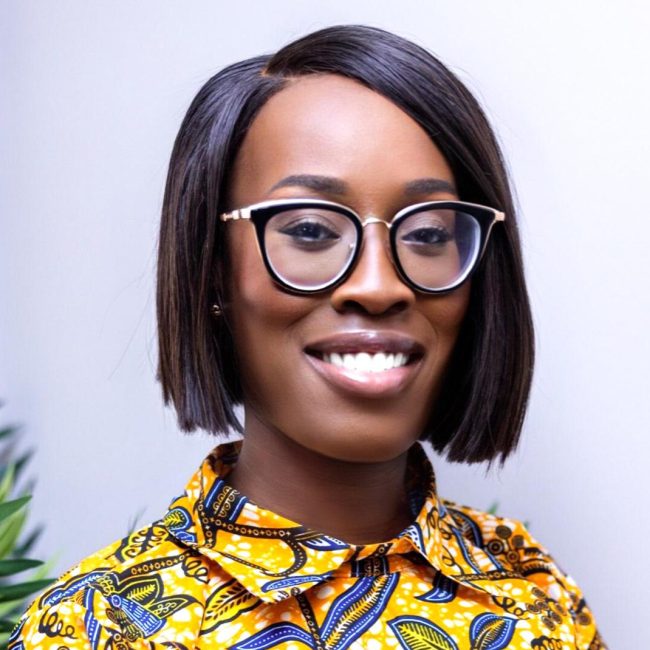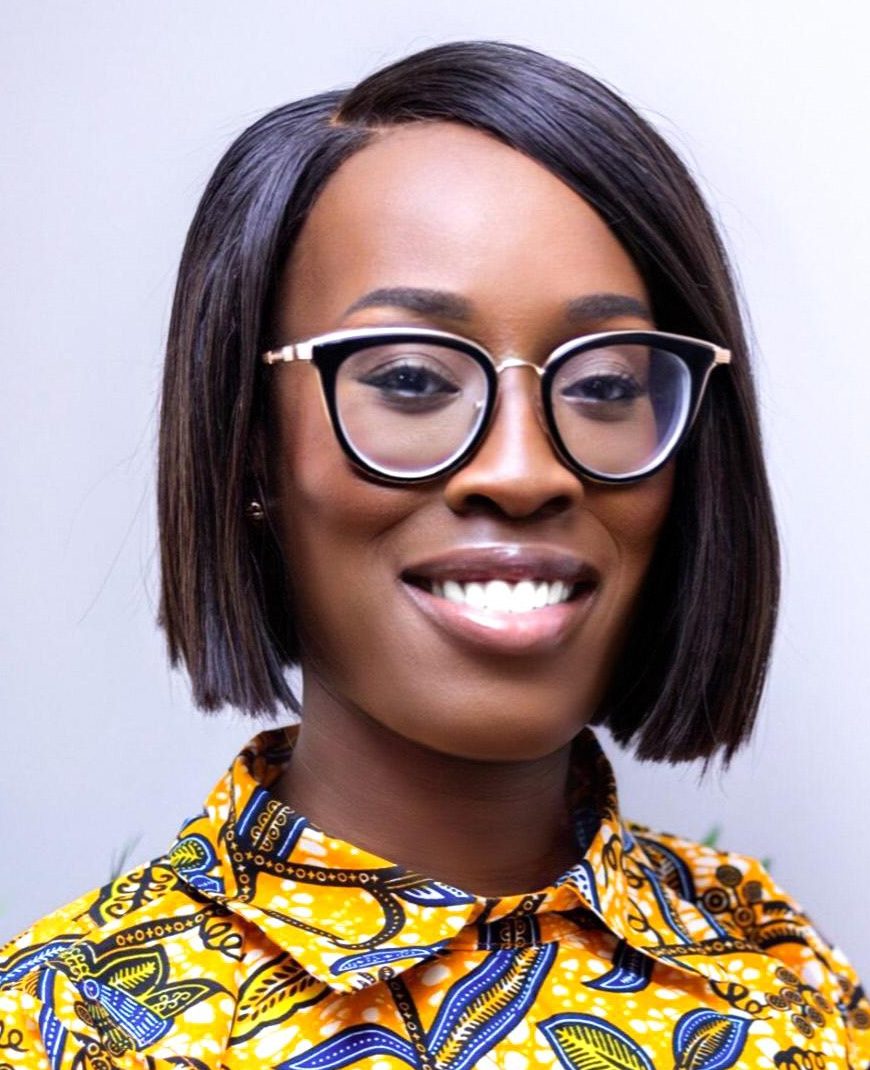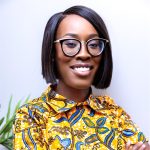Curated conversations with data science for social impact leaders on their career journeys
Pathways to Impact is a series of conversations with data for social impact leaders exploring their career journeys. Perry Hewitt, CMPO of data.org, spoke with Dr. Amy Yeboah Quarkume, Director of Graduate Studies for the Master’s Program in Applied Data Science at Howard University where she spoke about the benefits of learning from non-STEM individuals to bring their humanist mindset into data science and into technology.
How did you find your way to this work? How did you come to combine the discipline of African-American Studies with data for social impact?
I can pinpoint the moment: my husband is in the military, and during COVID we were traveling and watching the news in a hotel. It reported that AI had been used to determine the placement of testing centers for COVID-19–and they were largely placed outside of Black communities. And I wondered: how does AI do that? Who agreed with that decision? Clearly, it was relying on census data or other datasets in which African Americans are underrepresented. I realized we have these computer algorithms that are making decisions for people, but that lack quality data, and people’s lives are being negatively impacted. As a result, we were seeing African American communities facing disproportionately higher rates of exposure and death from Covid, while lacking access to testing.
I was sitting there as a humanist, someone who’s passionate about African-American studies, and I was feeling like history might repeat itself — particularly with everyone investing in AI.
I began to think about how we might mitigate this risk to our communities, and not re-create a situation where African-Americans were impacted negatively. This interest eventually led to Mellon awarding me a new direction grant, which I used to go back to school and learn data science. I wanted to learn about these algorithms and about big data–and how these things are impacting many vulnerable communities. I had some statistics in grad school, but I’ve learned Python literally in the past two years. I’ve learned some AI. I began this learning journey very, very recently; I passed most of my classes, and I failed a few. But it was a journey to be able to understand what is happening and what we need to fix to make a significant and needed impact.
Today, I’m the director of the data science program at Howard University. Howard, with the support of Mastercard, has launched an online master’s degree program in applied data science analytics, with an emphasis on social justice. In this program, we’re focusing on engaging non-STEM learners. Part of the conversation we’ve been having about impact involves diversifying the pipeline. How do we get more non-STEM individuals into the pipeline of bringing their humanist mindset into data science and into tech? How can these new entrants to the field create more robust conversations about data and AI and their impact?
We are benefiting from the perspectives of these non-STEM learners to tackle big questions that have yet to be explored thoroughly by the field.
Amy Yeboah Quarkume, Ph.D. Director of Graduate Studies for the Master's Program in Applied Data Science Howard University
In your role as the director of data science at Howard, which problems are you focused on solving with data for social impact?
In our program, we focus on three main areas of economic empowerment: environmental justice, social justice in general, and health equity. We are bringing students together to propose data-driven approaches to these issues. We have students coming from political science, from nutrition, from history, coming from all these non-STEM spaces to say, ‘I have an interest and it’s non-STEM — but I’m looking to dive into data science’. For example, I have a student who worked in banking and now wants to address the large disparity Black women face regarding retirement – she’s working on a machine-learning model to create a solution. These learners, these problem solvers, are seeking to use data. We are benefiting from the perspectives of these non-STEM learners to tackle big questions that have yet to be explored thoroughly by the field.
What were some unexpected blockers to your career entry or progression?
I think the biggest issue is the language barrier. Computer science coding is a language, and just like any other language, it’s best to learn at a young age. There’s an inherent benefit to introducing kids to Python and coding very early. I realized that being 30-something and learning a new language is difficult – you need to learn the language, and also adopt a shift in mindset and thought process that takes a while to develop. Going from not knowing Python, not knowing R not knowing any coding–transitioning to this computational thinking is different.
Also, it was a transition for me to see how we deal with data. In many cases, when you’re learning how to code cleanly, they’ll say, if something is missing, just delete it. So if I have a variable that has a lot of missing cases, they may say, just get rid of it, or kind of take two averages and give a midpoint for everything that’s missing. But from my perspective, we have to think about the missing data.
One barrier is learning the language, but another is unlearning the culture. The culture has to stop jumping over the data that’s missing and focusing only on the data that’s available.
Amy Yeboah Quarkume, Ph.D. Director of Graduate Studies for the Master's Program in Applied Data Science Howard University
For our communities, the question I have students address is why it’s missing. Can we fill in the gaps with more data instead of throwing it away? That’s a paradigm shift, thinking about what’s missing, and why it’s missing. How do we deal with underreporting? How do we allow women to be more represented in data? How do we get women more involved in the data work? All that just takes more time, and more sensitivity. We need to not continue to overlook what’s hidden or what’s not there.
I said one barrier is learning the language, but another is unlearning the culture. The culture has to stop jumping over the data that’s missing and focusing only on the data that’s available. Instead, we have to consider what’s unrepresented. If we’re creating a new culture of data for social impact, that requires a shift. Those are two things I would say are barriers both to my own learning and to the field in general.
Whether you’re thinking of yourself as a humanist or as an executive leader within a major university, what community of people bolsters your work?
Right now there are networks of Black women, Dr. Latanya Sweeney at Harvard, Dr. Safiya Noble at UCLA, and Dr. Ruha Benjamin at Princeton. I follow that community online and also through their published work. Their scholarship keeps me grounded in what’s possible. In big data and social impact, the temptation to just do data science is always there. To do data science with a focus on social justice, you do have to be surrounded by people who ask what’s missing and drive toward what’s possible. These scholars continue to shift your paradigm because the rest of the world is thinking of big data lakes, getting more numbers. But the missing part is the hard part: is this limited focus on more data healthy for us?
For example, we should consider: Do we need more data points? Do we need more satellites? Do we need to have more GIS locations, and surveillance? Being able to pull away from that impetus toward more and consider what is beneficial has been very healthy for me. Those scholars have fueled my work. Also, I’ve learned from those who are in library studies and communications. Even scholars who are in English; at Howard, the English department is very passionate about dealing with generative AI, and teaching writing. That’s also a space I like to stay connected to. There are many people who are not in data science or tech that are doing that work that keeps it grounded.
Part of the Pathways to Impact series
Which specific skills enable your contributions? You chose to retrain on data science, but is there a non-data science skillset that has strengthened your work?
I learned early on that leaders don’t run from problems. And there are many problems within the computer science, data science, and AI world.
I am not proficient in LLMs, nor am I a coder, but I do offer value in the questions that I’m asking because many times these algorithms are impacting my life. It affects everyone. For the average person, whether you’re scrolling through social media or paying your bills online, these algorithms are impacting daily lives. Sometimes it takes those of us who are confident to walk into a room that isn’t made for us and say, ‘I have a question,’ or ‘I don’t understand how this is working,’ or ‘How did you come to make this decision?’
If given the opportunity, more of us who are not in that space would find the confidence to enter these spaces, and we could see changes. But there is a real issue of opportunity. Many of these spaces are like algorithms: they’re black boxes. You don’t know where to ask the question.
And there are many times you need confidence–and persistence. For example, I was helping someone online and they wanted to go to customer service and there was no customer service. If the website or app was built to keep me out, and there’s nowhere to ask for my money or fraud issue, how do I complain about this?
In some cases, people who are coming from a certain zip code and buy a certain product are flagged for fraud. No one knows how to complain about receiving so many fraud alerts and that takes a toll on confidence. We need to ask companies to see what’s under the hood and push companies to be more transparent.
This kind of invisible exclusion does make you think of all the places people can be invisibly denied: a purchase flagged as fraud, an insurance claim, a plagiarism accusation…
And getting a job! At this point, there’s no job that’s going to take a paper application. It’s going to be electronic. If the right jobs are not displayed to you based on your demographic or location, the result is unemployment.
What advice do you have for someone new to the field but interested in doing this work? Where do you suggest they start?
If you’re new to the field and not in the space of STEM, I would say still come! We need more non-STEM humanists. We need you to come and to be confident about what you’re bringing to the space versus what you’re getting from the space. It won’t be easy, but your own domain expertise and experience can make data collection, analysis, and application better.
So that’s one. And then two, consider the changing nature of expertise. We all know that technology is changing very fast. Literally in the two years I’ve been learning, there have been four iterations of Open AI. The constant version updates are so consistent that the best thing you can do is bring your subject matter expertise to the technical conversation.
Third, I wouldn’t join this field thinking that you have to learn everything by yourself. The best thing to do is to partner with technical people who code, and with innovative people who can work with you to identify new approaches.
Finally, you should have an ear for policy. At the end of the day, policy is going to be the thing that dictates how things work. Even though there are market-driven approaches, a lot of technology will be regulated.
I learned early on that leaders don't run from problems. And there are many problems within the computer science, data science, and AI world.
Amy Yeboah Quarkume, Ph.D. Director of Graduate Studies for the Master's Program in Applied Data Science Howard University
What’s the next big thing that you see in data AI for social impact?
See the policy point above – I’m really looking at the US Presidential election. I think the election will determine the policy impacting the field in this country. After the election will determine whether people have the access, the infrastructure, the accessibility to be able to be a part of the conversation, or whether it will be a closed-door field.
If we do have access, then we need to engage young people in coding and data. That will help us reduce the digital and data divide: kids who can code, kids who can understand data, kids who can protect themselves and create their own digital footprints. CS for all, even from K to 12, will be very impactful.
What’s your don’t miss daily or weekly read?
I keep up with my field reading about the human implications of technology from the academics named. I check in with the New York Times Tech section just to kind of see what’s happening.
Most of all, I listen to my students and their views on technology. Honestly, that’s my daily check-in. I start the day by saying, okay, what’s happening? And they tell me. This generation is facing challenges: loans, jobs, savings, and buying a home. I learn a lot by listening to young people and what they’re struggling with, which is sometimes depressing because some of what they’re struggling with is unseen. They’re dealing with likes, followers, and this whole different sense of digital self, pressures that I didn’t have. And the threat of them losing themselves to AI is very real. We need to work together to address that.
About the Author
Perry Hewitt is the Chief Marketing and Product Officer of data.org where she oversees the marketing and communications functions, as well as digital product development.
Read moreSeries
Pathways to Impact
This data.org series interviews leaders in Data Science for Social Impact with a lens of how they got there, as well as the skills and experiences that have fueled their career progression.


